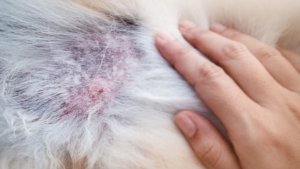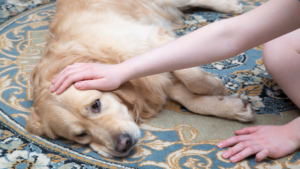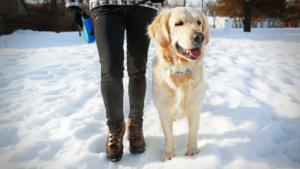Going Over Some Common Winter-Related Illnesses In Pets And Offering Advice On How To Prevent Them
Winter can be a magical season, but it also brings challenges for our furry companions. The cold weather, dry air, and seasonal hazards can make pets susceptible to specific illnesses. As pet owners, it’s essential to be aware of these risks and take steps to protect our pets’ health during the colder months.

1. Hypothermia
What It Is: Hypothermia occurs when a pet’s body temperature drops too low, often due to prolonged exposure to cold weather.
Symptoms: Shivering, lethargy, pale or cold skin, difficulty breathing, and in severe cases, collapse.
Prevention:
- Limit outdoor time, especially during freezing weather.
- Dress your pet in warm clothing like a sweater or jacket, particularly for smaller or short-haired breeds.
- Provide a warm, draft-free shelter for outdoor pets.

2. Frostbite
What It Is: Frostbite happens when extreme cold damages tissues, typically affecting ears, tails, paws, and noses.
Symptoms: Pale or gray skin, swelling, blisters, or blackened, dead tissue in severe cases.
Prevention:
- Avoid prolonged outdoor exposure during freezing temperatures.
- Use pet-safe booties to protect your pet’s paws from cold and icy surfaces.
- Check and dry their paws after walks to remove ice and snow.

3. Respiratory Infections (Kennel Cough & Feline Upper Respiratory Infections)
What They Are: Just like humans, pets can catch colds or respiratory infections during winter. These infections are more common in pets that spend time in close quarters with other animals.
Symptoms: Coughing, sneezing, nasal discharge, lethargy, and fever.
Prevention:
- Keep your pet up-to-date on vaccinations, especially Bordetella for dogs.
- Minimize exposure to sick animals.
- Ensure their living environment is warm and free of drafts.

4. Arthritis Flare-Ups
What It Is: Cold weather can exacerbate joint pain in pets, particularly older ones or those with pre-existing arthritis.
Symptoms: Stiffness, limping, reluctance to move, or difficulty climbing stairs.
Prevention:
- Provide a warm and comfortable sleeping area with extra padding or orthopedic beds.
- Use pet-safe heating pads or blankets to ease discomfort.
- Consult your veterinarian for joint supplements or anti-inflammatory medications.

5. Dry Skin and Coat Issues
What It Is: Winter’s low humidity can dry out a pet’s skin, leading to itchiness, flakiness, and discomfort.
Symptoms: Excessive scratching, dandruff, and a dull coat.
Prevention:
- Avoid over-bathing your pet, as it can strip natural oils.
- Use a humidifier in your home to maintain moisture in the air.
- Include omega-3 fatty acids in your pet’s diet to promote healthy skin and coat.

6. Antifreeze Poisoning
What It Is: Antifreeze (ethylene glycol) is highly toxic to pets and often consumed because of its sweet taste.
Symptoms: Vomiting, lethargy, uncoordinated movements, seizures, and kidney failure.
Prevention:
- Store antifreeze and other chemicals securely.
- Clean up any spills immediately.
- Use pet-safe antifreeze products.

7. Gastrointestinal Upsets
What It Is: Pets may be tempted to eat holiday leftovers, snow, or ice, leading to stomach issues.
Symptoms: Vomiting, diarrhea, and abdominal discomfort.
Prevention:
- Keep holiday food out of reach, especially chocolate, bones, and rich, fatty foods.
- Ensure they have access to clean, unfrozen water.
General Tips For Winter Pet Health
- Regular Check-Ups: Ensure your pet has a winter wellness check with their veterinarian.
- Diet and Exercise: Adjust their diet if they are less active in winter but ensure they maintain a healthy weight.
- Shelter Safety: If your pet stays outdoors, ensure their shelter is insulated and free from snow and wind.
- Hydration: Pets need water just as much in winter as in summer. Prevent their water bowl from freezing.
By being proactive and vigilant, you can help your pets stay healthy and happy throughout the winter season. Keep an eye out for any unusual behavior or symptoms, and don’t hesitate to consult your veterinarian if you have concerns. A little extra care during the colder months goes a long way in keeping your pets safe and comfortable.

Hire A Pet Sitter & Dog Walker This Winter!
Pets need regular stimulation to stay happy and mentally healthy. If you don’t have the time to regularly stimulate your pets, then consider hiring a professional pet sitter! Here at Stay At Home Pet Services, we offer quality pet sitting services at competitive prices. We have over 10 years of experience, our sitters are certified in pet first aid & CPR, and we love all pets as if they were our own.
We are located in Cincinnati, OH and service the following areas of East Walnut Hills, Hyde Park, Mt Lookout, Oakley, Norwood, Kennedy Heights, Pleasant Ridge, Tusculum, East End, Mariemont, Fairfax, Madisonville, Mt Washington, Dillonvale, Deer Park, Silverton, Kenwood, Madeira, Indian Hill, and Anderson Township.
Click here to become a client today or give us a call at 513-706-7702. Be sure to check us out on Facebook and Instagram too! We post everyday, so make sure you follow us so you don’t miss out on any adorable pet pictures.

